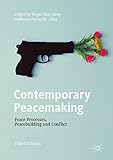Contemporary peacemaking : peace processes, peacebuilding and conflict / edited by Roger Mac Ginty, Anthony Wanis-St. John.
Contributor(s): Mac Ginty, Roger [editor.] | Wanis-St. John, Anthony [editor.]
Language: English Publisher: Cham, Switzerland : Palgrave Macmillan, [2022]Edition: Third editionDescription: 1 online resourceContent type: text Media type: computer Carrier type: online resourceISBN: 9783030829612; 9783030829629; 3030829626Subject(s): Pacific settlement of international disputes | PeaceDDC classification: 327.1/72 LOC classification: JZ6010| Item type | Current location | Home library | Call number | Status | Date due | Barcode | Item holds |
|---|---|---|---|---|---|---|---|
 BOOK
BOOK
|
COLLEGE LIBRARY | COLLEGE LIBRARY SUBJECT REFERENCE | 327.172 C7672 2022 (Browse shelf) | Available (In Process) |
Includes bibliographical references and index.
1. Understanding Ripeness: Making and Using Hurting Stalemates -- 2. Cultivating Peace: A Practitioner's View of Deadly Conflict -- 3. Conflict Analysis: A System's Approach -- 4. The United Nations and Peacemaking -- 5. Women's Participating in Peace Processes -- 6. Indigenous Approaches to Peacemaking -- 7. Peacemaking Referendums: Advantages and Challenges for Peace Processes -- 8. Refugees, Peacemaking and Durable Solutions to Displacement -- 9. Time, Sequencing and Peace Processes -- 10. Mediation and Ending of Conflicts -- 11. Diffusion vs. Coherence: The Competitive Environment of Multiparty Mediation -- 12. Inclusivity in Peace Processes: Civil Society and Armed Groups -- 13. Negotiating Peace in the Shadows -- 14. Violence and Peace Processes -- 15. Peacemaking and Election Violence -- 16. Disarmament, Demobilisation and Reintegration of Ex-Combatants -- 17. Security Sector Reforms -- 18. Peace Processes and their Agreements -- 19. Power Sharing after Civil Wars: Matching Problems to Solutions -- 20. Peace Accords and Human Rights -- 21. The Post-Conflict Constitution as a Peace Agreement -- 22. Transitional Justice and Peacemaking/Peacebuilding -- 23. Peace Education as a Peacemaking Tool in Conflict Zones -- 24. Post Accord Violence. 26. Everyday Economic Experiences and Peace Processes.
"This fully updated third-edition of Contemporary Peacemaking is a state of the art overview of peacemaking in relation to contemporary civil wars. It examines best (and worst) practice in relation to peace processes and peace accords. The contributing authors are a mix of leading academics and practitioners with expert knowledge of a wide arrays of cases and techniques. The book provides a mix of theory and concept-building along with insights into ongoing cases of peace processes and post-accord peacebuilding. The chapters make clear that peacemaking is a dynamic field, with new practices in peacemaking techniques, changes to the international peace support architecture, and greater awareness of key issues such as gender and development after peace accords. The book is mindful of the intersection between top-down and bottom-up approaches to peace and how formal and institutionalized peace accords need to be lived and enacted by communities on the ground."-- Provided by publisher.

There are no comments for this item.